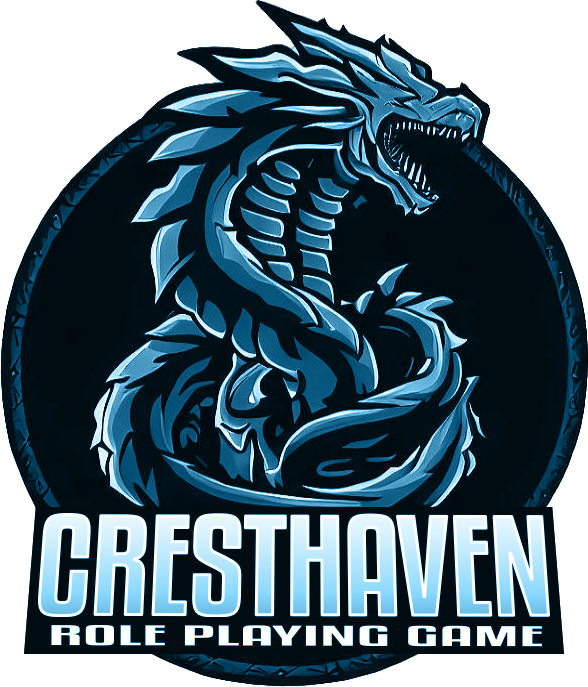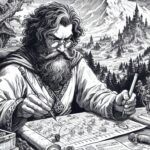Forget memorizing spells! In Cresthaven, you can cast your favorites over and over again. Just keep an eye on your mana, the magic juice that fuels your spells. Rest up to get it back, or guzzle a rare mana potion in a pinch.
There are a few things to keep in mind:
- No Wimpy Spells: You can’t cast spells stronger than your level.
- Focus Up: Casting takes all your concentration, so no multitasking!
- Talk the Talk: Gotta speak to cast, so keep your mouth free.
- Gotta See It: You need a clear view of your target to cast a spell on them.
Are we missing spells? You can suggest spells here.
Mana
Mana is the amount of magical energy a character has to spend after a long rest.
- Wizard’s mana is their level plus their Intelligence bonus (include ability focus).
- Cleric’s mana is their level plus their Wisdom bonus (include ability focus).
- Druid’s mana is their level plus their Wisdom bonus (include ability focus).
For example a 3rd level wizard with +3 Intelligence would have 8 mana to spend before they’d need to rest to recover their mana.
Spell Mana Cost
A spells mana cost is determined by its level.
Ex. 2nd level spell would cost 2 mana.
Recovering Mana
To recover mana a character must rest. Assuming that a full 10 hours of rest can recover 100% of a character’s mana, then for each hour of rest, a character would recover 10% of their total mana.
Sacrifice Self
A spell caster can choose to use their hit points in the event that they run out of mana. Only after a caster’s mana pool has reached zero may they use their health. 2 hit points = 1 mana. Damage taken to a character this way heals like normal.
Potion of Mana
Like a potion of healing, the potion of mana can restore 1d8 mana to a spell caster. Mana can never exceed the maximum value available. These potions are expensive, rare and coveted by magic users. Typical costs are 800gp and up.
Limitations of Spell Casting
- No spell caster could cast a spell for a mana cost higher than their level.
- The spell caster cannot take any other action in a round when casting a spell.
- A spell caster who cannot speak or is bound can not cast a spell.
- If the spell caster takes damage before their turn in combat, the spell is interrupted and the mana is lost.
- The spell caster must be able to see the target the spell is to be cast on.
Wizard Limitations
Wizards cannot cast a spell for which they do not have the formula. This means that they must have the spell in their hand – either on a scroll or in their spell book at the time of casting. This also means that wizards can potentially have access to many more spells than any of the other spell caster classes.
Note: If the spell formula is lost, such as a spell book stolen or destroyed, then the intricate knowledge is also lost and spells cannot be cast anymore.
Cleric Limitations
Clerics have a limited number of spells provided by their gods. Unlike a spell book, their magic is divine and cannot be destroyed, but it can be taken from the character if the character does something against their god’s (DM) wishes. In addition, the cleric must have their holy symbol in one hand to cast their spells.
OPTIONAL: It is recommended that the DM limit the spell choices clerics can choose from. The DM has the final say in spell picking for a cleric, and is the limit of choosing a god driven character.
Druid Limitations
Druids draw their power from the very fabric of life itself. Druids call this source Gaia. Unlike other magic classes they can cast any of their spells, but only in the positive. Reverse or evil versions of spells are not available to them.
Casting Spells
The spell caster must roll d20 plus their modifier (WIS or INT with Ability Focus) vs a DC 10 + spell cost/level. If the roll does not meet or exceed the required number, then the mana is used, and the spell fails.
For example a 3rd level wizard with +3 INT casting a 2nd level spell roll d20+5 (+3 INT +2 Ability Focus) vs DC12 (10 +2nd level spell)
Saving Against Spells
The Difficulty Check for saving against a spell is: 10 + the spell level. If no ability score is specified – use the Wisdom ability score.
Learning New Spells
Wizards acquire spells in the form of scrolls they find when adventuring. Once they find a scroll, they must “scribe” it into their spell book to keep it. Once a spell is ascribed into the spell book, the character my use it as normal.
Clerics have access to their entire spell list. They must pray to their deity each day to receive the number of spells allowed. This can completely change after each 8-hour rest. Spells received are limited to the whim of the deity (the game master) and may differ from the spells the character is attempting to acquire.
Druids have access to their entire spell list. They must attune to nature each day to receive the number of spells allowed. This can completely change after each 8-hour rest.
Complete Spell List
Are we missing spells? You can suggest spells here.
Zero Level
- Bleed
- Bless
- Daze
- Detect Magic
- Detect Poison
- Ghost Sound
- Guidance
- Heal Wound
- Inflict Wound
- Know Direction
- Mage Hand
- Mending
- Message
- Purify Food and Drink
- Ray of Frost
- Sacred Flame
- Spark
- Virtue
1st Level
- Affect Normal Fires
- Burning Hands
- Charm Person
- Color Spray
- Command
- Comprehend Languages
- Create Water
- Cure Light Wounds
- Dancing Lights
- Detect Animals
- Detect Evil
- Effect Wind
- Enlarge
- Entangle
- Erase
- Faerie Fire
- Feather Fall
- Floating Disk
- Hide from Animals
- Hold Portal
- Identify
- Jump
- Keen Senses
- Light
- Magic Aura
- Magic Missile
- Mending, Improved
- Pass without Trace
- Protection from Evil
- Read Weather
- Remove Fear
- Resist Cold
- Sanctuary
- Shield
- Shocking Grasp
- Silent Image
- Sleep
- Unseen Servant
- Ventriloquism
2nd Level
- Augury
- Chant
- Clairvoyance
- Continual Light
- Darkness
- Detect Charm
- Detect Invisibility
- ESP
- Find Traps
- Fool’s Gold
- Forget
- Hold Person
- Invisibility
- Knock
- Levitate
- Locate Object
- Mage Armor
- Magic Mouth
- Mirror Image
- Pyrotechnics
- Ray of Enfeeblement
- Resist Fire
- Rope Trick
- Scare
- Shatter
- Silence
- Slow Poison
- Snake Charm
- Speak with Animals
- Spider Climb
- Spiritual Weapon
- Stinking Cloud
- Strength
- Web
- Wizard Lock
3rd Level
- Animate Dead
- Blink
- Clairaudience
- Cure Blindness
- Cure Disease
- Dispel Magic
- Explosive Runes
- Feign Death
- Fireball
- Flame Arrow
- Fly
- Forcast Weather
- Glyph of Warding
- Gust of Wind
- Haste
- Infravision
- Lightning Bolt
- Monster Summoning I
- Phantasmal Force
- Prayer
- Protection from Normal Missiles
- Speak with Dead
- Suggestion
- Tiny Hut
- Tongues
- Water Breathing
4th Level
- Charm Monster
- Confusion
- Cure Serious Wounds
- Detect Lie
- Dig
- Dimension Door
- Divination
- Enchanted Weapon
- Exorcise
- Extension I
- Fear
- Fire Charm
- Fire Shield
- Fire Trap
- Grove of Trees
- Hallucinatory Terrain
- Ice Storm
- Lower Water
- Minor Globe of Invulnerability
- Mnemonic Enhancement
- Monster Summoning II
- Neutralize Poison
- Plant Growth
- Polymorph Other
- Polymorph Self
- Raise Dead
- Speak with Plants
- Sticks to Snakes
- Wall of Fire
- Wall of Ice
- Wizard eye
5th Level
- Cloudkill
- Commune
- Conjure Elemental
- Dispel Evil
- Feeblemind
- Hold Monster
- Magic Jar
- Passwall
- Quest
- Telekinesis
- Teleport
- True Seeing
- Wall of Force
- Wall of Stone
6th Level
- Death Spell
- Disintegrate
- Invisible Stalker
- Move Earth
- Project Image
- Reincarnate
- Stone to Flesh
- Stoneform
- Wall of Iron
- Weather control
7th Level
- Delayed blast fireball
- Force Cage
- Limited Wish
- Power Word Blind
- Prismatic Spray
- Reverse Gravity
- Spell Turning
- Statue
- Summon Object
- Teleport Object
- Teleport, Greater
8th Level
9th Level
This Post Has 9 Comments
Leave a Reply
You must be logged in to post a comment.



Spell lists for Clerics and Druids need to be reduced as they can choose to cast ANY of their spells that are their current level and below.
Do zero level spells cost zero mana?
Correct!
Hi, there are some spells in DnD which are included this system as magical items (water walk, gaseous form.. etc). I suggested some of them to add. Do you considerto add some more?
Of course! Please suggest as many as you’d like.
You say casting spells are just like using a skill, but then say the spell caster must roll d20 plus their modifier (WIS/INT + Level) vs a DC 10 + spell cost/level. If it is like a skill, shouldn’t it be roll d20 + INT/WIS + focus (which is leve/2 rounded up)?? So for example a 3rd level wizard with +3 INT casting a 2nd level spell roll d20+5 vs 12? Thanks
Yes. That is correct.
Hi,
Do you get your ability focus added to your mana? For example a 9th level wizard with +3 INT should have mana = 9 + 3 + 5 = 17, or mana = 9 + 3 = 12?
Either way, it looks to me like spell casters aren’t so powerful at high levels. I wonder if I have this right? For instance that 9th level wizard (assuming 17 mana) could cast a 1st, a 3rd, two 4th, and a 5th for example. If only 12 mana, then a 3rd, a 4th, and a 5th for example. In dnd 5e (which I know this system isn’t, but just for comparison), a 9th level wizard could do four 1st, three 2nd, three 3rd, three 4th, and a 5th. As the levels go up the difference gets bigger. At 20th level here the wizard gets 33 mana (or 23 if focus not added), and in dnd 5e if you add up the spells you get 4 + 3×2 + 3×3 + 3×4 + 3×5 + 2×6 + 2×7 + 8 + 9 = 89 mana required, so a big difference in power.
Anyway, it is a different system, just checking that I actually understand it. Also, it is nice that at lower levels here the wizard is actually a bit stronger.
Thanks
Matt
Yes, ability focus applies to the Mana of casters. A 9th level caster maxed out (race/class) would cast with 18 mana – also keep in mind that using Mana in SimpleDND is completely different that in other D&D type games. You can cast the same spell over and over and over.
D&D 5e is about making super humans, not about role-playing. Everyone gets superpowers right away. A wizard should always work smarter.